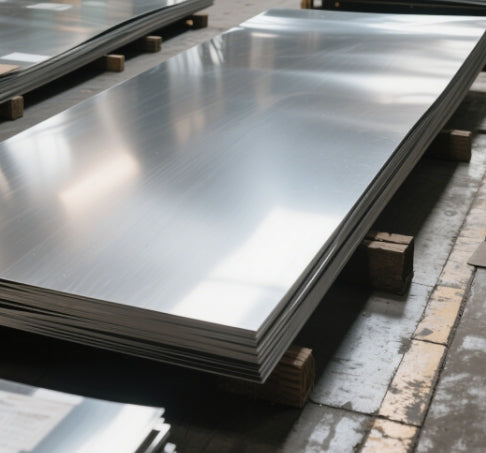StockSteel
High-Tensile plate stainless steel | Railroad Tie Plates with Diamond Grip
High-Tensile plate stainless steel | Railroad Tie Plates with Diamond Grip
Couldn't load pickup availability
High-Tensile Plate Stainless Steel | Railroad Tie Plates with Diamond Grip
Product Specifications & Features
| Category | Details |
|---|---|
| Material | Stainless steel flat plate (Grade 316/304, AISI standards) |
| Tensile Strength | 800-1000 MPa (High-tensile, suitable for heavy-load applications) |
| Hardness | 200-250 HV (Vickers Hardness) |
| Thickness Range | 6 mm to 50 mm (Customizable) |
| Surface Finish | Diamond Grip Pattern (Anti-slip design), Polished/Satin/Brushed options |
| Dimensions | Standard: 1200 mm × 2400 mm; Custom sizes available (e.g., stainless steel hole plate designs) |
| Corrosion Resistance | ASTM A240 compliant; resistant to saltwater, acids, and extreme weather conditions |
| Processing | Laser cutting, CNC machining, cold forging, and precision welding |
| Certifications | ISO 9001, EN 10088-2, and ASTM A276/A479 standards |
Technical Highlights
1. Tensile & Bending Strength
Our high-tensile stainless steel flat plate is engineered to withstand dynamic loads and repetitive stress, making it ideal for railroad tie plates and structural applications. The tensile strength of 800-1000 MPa ensures exceptional durability under compression, while the bending strength (1,200-1,500 MPa) prevents deformation even in high-traffic environments. The Diamond Grip surface enhances load distribution, reducing wear on rail tracks and improving safety.
2. Material Identification & Marking
Each plate is laser-etched with a unique identifier, including:
- Grade (e.g., 316/304)
- Batch Number
- Compliance Marks (ASTM/EN standards)
This traceability ensures quality control and simplifies maintenance tracking for industrial users.
3. Weight Calculation
The weight of a stainless steel flat plate is calculated using:
For example, a 10 mm thick plate measuring 1.2 m × 2.4 m weighs approximately 230.4 kg.
4. Why Does Stainless Steel Rust?
While stainless steel is highly corrosion-resistant, localized rusting may occur due to:
- Chloride Exposure: Prolonged contact with saltwater or de-icing chemicals can degrade passive layers.
- Mechanical Damage: Scratches or abrasions expose raw steel to oxidation.
- High-Temperature Oxidation: Extreme heat (above 800°C) disrupts chromium oxide layers.
Our plates mitigate these risks through advanced passivation treatments and grade-specific alloying (e.g., molybdenum in Grade 316).
Applications
- Railroad Tie Plates: Diamond Grip design enhances rail stability and reduces lateral movement.
- Architectural Hardware: Ideal for stainless steel door lock cover plates and heavy-duty hinges.
- Industrial Machinery: Custom stainless steel hole plates for filtration, shielding, and structural frameworks.
Why Choose Our Stainless Steel?
- Superior Quality Control: Rigorous testing (chemical composition, hardness, and tensile checks) ensures compliance with global standards.
- Custom Solutions: Tailored dimensions, perforations, and surface finishes to meet project-specific needs.
- Longevity: Enhanced corrosion resistance reduces lifecycle costs in harsh environments.
- Global Certification: Backed by ISO and ASTM certifications, trusted by rail operators and construction firms worldwide.
- Sustainable Manufacturing: Eco-friendly processing with 90% recycled stainless steel content.

